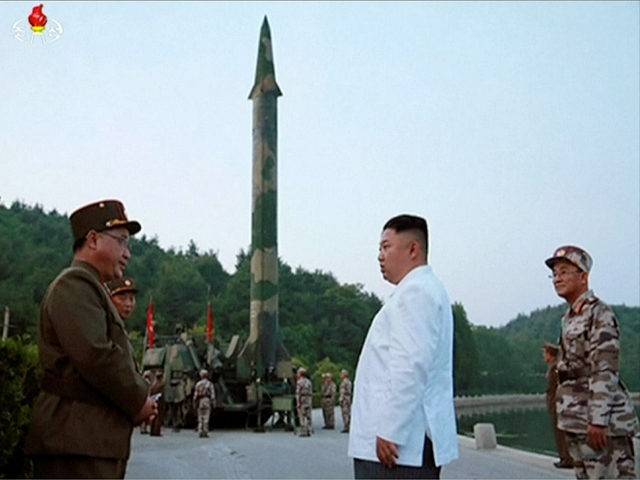Defense Secretary James Mattis over the weekend assured nervous allies in the Asia Pacific that the U.S. military is committed to securing stability in the region, amid several rising threats.
“The United States will continue to adapt and continue to expand its ability to work with others to secure a peaceful, prosperous and free Asia, one with respect for all nations upholding international law,” Mattis told regional leaders and other attendees at the Shangri-La Dialogue, an annual Southeast Asian security conference in Singapore, on Saturday.
“Because we recognize no nation is an island isolated from the others, we stand with our allies and the international community to address pressing security challenges, and do so together,” he said.
The region is facing a North Korea working on obtaining a nuclear weapon capability, a China that is increasingly challenging its neighbors militarily, and a rising terrorist threat from the Islamic State (ISIS) and other terrorist groups.
Mattis said he would work with Senate and House Armed Services Committee Chairmen John McCain (R-AZ) and Mac Thornberry (R-TX) on boosting spending on U.S. military assets there.
“And I look forward to working with them to develop an Asia-Pacific stability initiative that complements the ongoing large-scale investment in our budget to improve and reinforce the U.S. military’s capabilities across the region,” he said.
Mattis said that, currently, 60 percent of all U.S. Navy ships, 55 percent of Army forces, and about two-thirds of the fleet Marine forces are assigned to the Pacific, and that, soon, 60 percent of U.S. overseas tactical aviation assets will also be assigned there.
Mattis called North Korea a “clear and present danger” and the “most urgent and dangerous threat to peace and security in the Asia-Pacific.” He said the threat was not new, but that the current regime has increased the speed and scope of its efforts.
“President Trump has made clear that the era of strategic patience is over. As a matter of U.S. national security, the United States regards the threat from North Korea as a clear and present danger,” he said.
Mattis said the Trump administration is “encouraged” by China’s “renewed commitment” to work towards denuclearization and warned that North Korea is a liability that will increase disharmony in the region and more defense spending by regional powers.
He emphasized that the U.S. is working with the United Nations, allies, and partners to pressure North Korea, diplomatically and economically. But he said U.S. commitment to the defense of South Korea and Japan is “ironclad.”
“We are trying to exhaust all possible alternatives to avert this race for a nuclear weapon… in violation of the United Nations’ restrictions on North Korea’s activities,” he said.
He also pointed out that the U.S. would protect the homeland from the threat posed by North Korea, noting that the U.S. just recently successfully conducted a test interception of an intercontinental ballistic missile threat.
Mattis also called on China to stop placing military equipment on islands and other land features in the East and South China Seas that are also claimed by other nations and sit in what the U.S. considers international waters crucial to commerce.
“We oppose countries militarizing artificial islands and enforcing excessive maritime claims unsupported by international law. We cannot and will not accept unilateral coercive changes to the status quo,” Mattis said.
He urged China and other nations to use existing arbitration mechanisms to peacefully resolve territorial disputes, noting a 2016 ruling by the Permanent Court of Arbitration on a case brought by the Philippines over the South China Sea.
He also said the U.S. military would continue freedom of navigation operations in the South China Sea, which have rankled China. Such operations take place within 12 nautical miles of land claimed by a nation, or what would typically be territorial waters, to underscore they are open to the international community.
“Our operations throughout the region are an expression of our willingness to defend both our interests and the freedoms enshrined in international law,” Mattis said.
Mattis also discussed a resurgent terrorist threat in the Philippines and said the U.S. is helping to train, advise, assist, and help modernize the nation’s forces.
The defense secretary said the U.S.’s primary effort in the Asia Pacific remains to strengthen alliances.
But he also said all countries need to “contribute sufficiently to their own security,” a key belief held by President Trump.
At the same time, Mattis reassured allies that the U.S. would not bargain away their security as some in South Korea and Japan fear it might do in order to gain China’s help to denuclearize North Korea.
“We will also continue to work together with our longtime, steadfast allies to maximize regional security. We will ensure we have the military means to keep the peace. But we will not use our allies and partners or our relationships with them, or the capability integral to their security as bargaining chips,” he said.
He also noted that the Trump administration considers the region a “priority.”
He insisted that the U.S.’s decision not to follow through with the Trans-Pacific Partnership, a trans-regional trade deal, did not mean the U.S. was withdrawing from the region.
“It means one avenue did not meet our nation’s — population’s desires. But it doesn’t mean we’re turning our back on relations that we would work out on a bilateral basis as a result,” he said.
“And from my first trips as Secretary of Defense, and from Vice President [Mike] Pence’s first trips, Secretary of State [Rex] Tillerson’s trips, the American administration is demonstrating the priority that we place on relationships in the Asia-Pacific region, a priority region for us.”

COMMENTS
Please let us know if you're having issues with commenting.